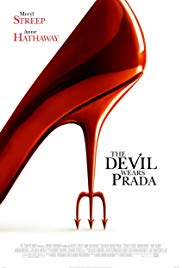
If I were pitching Lauren Weisberger’s novel “The Devil Wears Prada” around Hollywood, I’d call it, “’The Devil’s Advocate’ of fashion.” For all I know, that’s exactly what they did. That “The Devil’s Advocate” isn’t a great film (though it certainly has its charms) is not the point. The key to the pitch is making the producers feel comfortable, and referencing “Advocate” is something that they can wrap their heads around. “Right, so instead of Al Pacino, we have our eye on Meryl Streep as the Devil. Even the role of the soul-selling innocent will be a doe-eyed brunette. It can’t miss!”
And, in a move that can only be described as requiring wheelbarrow-sized onions, the studio decided to conduct an extreme exercise in counter-programming and open “The Devil Wears Prada” opposite “Superman Returns.” And guess what? It’s going to work like a charm. This way, the “Superman” diehards can see the movie wearing their red capes (don’t laugh, there was a guy wearing one at our screening), and their girlfriends can plan a girls’ night out away from the fanboys. Even better, both parties can come home from their movie of choice and say that it was thoroghly enjoyable, if flawed. And here’s the part you don’t want your significant other to know: her movie is just a little bit better.
Anne Hathaway stars as Andy Sachs, an aspiring writer who interviews for a job as an assistant at the fashion mag “Runway” because she has hit the wall trying to land work at a newspaper. What Andy doesn’t realize is that she is applying to work for the ice queen Miranda Priestly (Meryl Streep), the magazine’s editor-in-chief and the Grand Pooh-Bah of fashion tastemakers (just ask Miranda, she’ll tell you). The first meeting is not pleasant, with everyone on her staff, from Miranda to #1 assistant Emily (Emily Blunt) to art director Nigel (a hilarious Stanley Tucci) making no bones about how terribly unfashionable – and therefore unworthy – Andy is. But Miranda hires her despite these horrible flaws in her character. Andy, of course, is completely unprepared for what a high-maintenance lunatic Miranda is about her job, but being smart and resourceful, she finds a way to survive, even when it means scoring a copy of the manuscript to what will soon be one of the biggest selling books of all time. The catch, of course, is that in order to become good at her job, she has to forget about having any semblance of a social life (Nigel laughs at her when she merely admits to having trouble juggling life with work), much to the chagrin of boyfriend Nate (Adrian Grenier of “Entourage”). Matters are made worse by the conniving Christian (Simon Baker), an established writer who can help Andy land her dream job, for the right price, of course.
It’s actually rather sad that someone’s real life (the story is a fictionalized account of Weisberger’s apprenticeship under “Vogue” editor Anna “Nuclear” Wintour) mirrored the supernatural terror of “The Devil’s Advocate.” The one difference, though, was that Miranda Priestly is a better devil than Pacino’s John Milton, in that she made no attempt to hide her contempt for Andy, thus giving Andy incentive from the get-go to walk away. Milton, meanwhile, had to seduce Keanu Reeves every step of the way. Both, however, appealed to the deadly sins in their victims, and Andy was nothing if not proud.
Hathaway has a hell of a role here, pardon the pun, and while there are times where she doesn’t say the one thing that the audience is begging her to say (“There was a freaking hurricane!”), she deftly straddles the line of staying true to herself while allowing her new job/life to mold her in ways she wouldn’t have dreamt of months before. Tucci and Blunt, as the two most popular targets of Miranda’s “whimsy,” are the experts of reflexive sarcasm that you’d expect, though Emily, unlike Nigel, never gets a chance to show any qualities that would pass for human. She’s all harpy, all the time, and while it’s funny, it’s only funny to a point. And then there’s Streep, who rips off page-long lists of instructions (most of which are gloriously shot in one take) to her underlings, making sure to throw in piercing jabs at every opportunity without raising her voice or breaking a sweat. Think of any hell-based cliché – trial by fire, the boss from hell – and Streep makes a mockery of it. If John Milton saw Miranda in a dark alley, he’d beg God for mercy on his soul.
Where the movie gets dicey is in its life-imitating-art predictability. Of course Andy is going to have to choose between her friends and her career. Of course Andy is going to have to tell a co-worker that she’s getting something the co-worker desperately wanted. Conversely, of course the screenwriters will make drastic changes to how the real story actually ends, in order to give the audience an unnecessary fairytale ending. On the plus side, the book was wildly overrated (so my wife tells me), so it could be argued that the interference of some screenwriters was a good thing, at least in terms of dialogue. The screenwriters behind “The Devil Wears Prada” should have to watch “Broadcast News” – or perhaps “Election” – before putting another pen to paper. They got things mostly right, but that ending cost them a half star. Lord knows, if someone had shown Miranda Priestly that ending, she would have eaten their children.
 (3.5 / 5)
(3.5 / 5)



